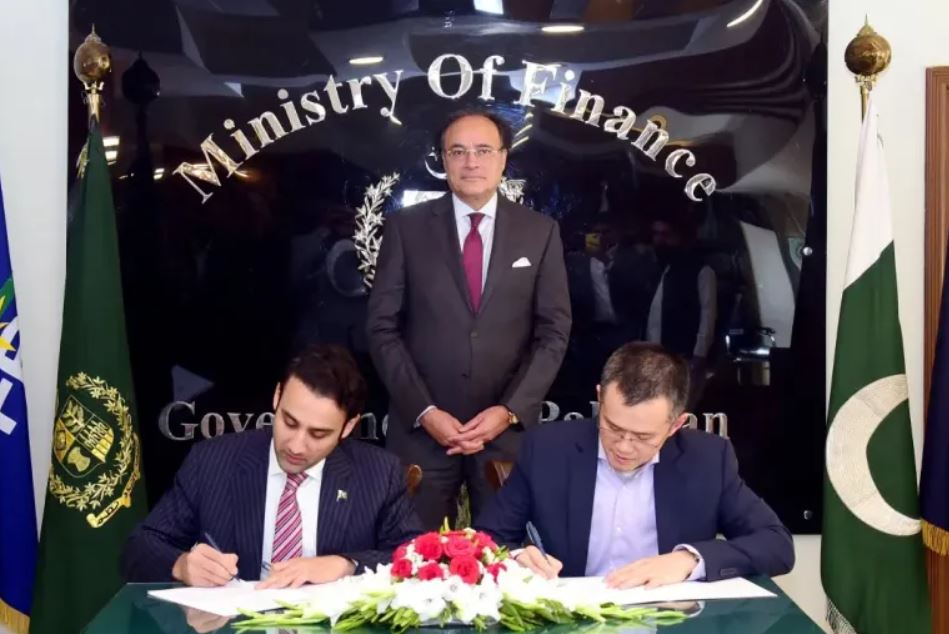
In a surprising turn of events, Pakistan is now embracing cryptocurrency. The country, which once banned crypto transactions, is making moves to become a regional leader in digital finance.
This shift comes with the creation of the Pakistan Crypto Council (PCC), launched in March 2025. Even more striking is the appointment of Binance founder Changpeng Zhao, also known as CZ, as an official adviser to the new crypto body.

A Landmark Appointment
On April 7, 2025, CZ signed on to become an adviser to Pakistan’s PCC. Standing beside the national flags of Pakistan, Zhao pledged support for building the country’s crypto ecosystem. The move signals a clear change in Islamabad’s attitude toward digital currencies.
Finance Minister Muhammad Aurangzeb called the appointment a “landmark moment” for Pakistan. “We are sending a clear message to the world: Pakistan is open for innovation,” he said. He added that with CZ’s guidance, Pakistan hopes to become a hub for Web3, blockchain, and digital finance.
CZ is a well-known name in the crypto space. Born in China and now a Canadian citizen, his estimated wealth exceeds $60 billion. In 2024, he served a four-month prison sentence in the U.S. after pleading guilty to violating anti-money laundering laws. Still, he remains a respected figure in global crypto circles.
According to the Ministry of Finance, Zhao will help develop Pakistan’s crypto regulations, infrastructure, education, and adoption strategies.
“Pakistan is home to 240 million people. Over 60% are under 30 years old. The potential here is massive,” Zhao said in a statement.
Changing the Rules
The government’s move marks a dramatic policy shift. In 2018, Pakistan’s central bank had banned banks from handling crypto-related transactions. Now, it seems ready to welcome innovation with caution.
Alongside CZ, British Pakistani entrepreneur Bilal bin Saqib was appointed as the chief adviser to Finance Minister Aurangzeb. Speaking in March 2025, Saqib said that between 15 and 20 million Pakistanis already own cryptocurrencies.
“We’re talking about billions of dollars in crypto transactions,” Saqib noted. “We want to legalize it, build a framework, attract investment, and help the ecosystem grow.”
Observers say the global environment is also pushing Pakistan to act. U.S. President Donald Trump recently signed an executive order creating a crypto working group. He later announced plans to include Bitcoin and four other cryptocurrencies in America’s strategic reserves.
“Trump is making crypto a national priority. Every country, including Pakistan, will have to follow,” Saqib said.

Regulation or Risk?
Still, not everyone agrees that Pakistan needs crypto. Investor and KTrade Securities chairman Ali Farid Khwaja said the country can no longer ignore digital assets.
“About 20 million Pakistanis use offshore platforms. The government earns nothing in taxes because those platforms aren’t local,” Khwaja said.
He believes that regulation is essential—not to promote crypto blindly but to make its use legal, safe, and transparent. “We need to protect investors, prevent scams, and collect taxes,” he said.
However, Khwaja also warned that once regulations are in place, some users may lose interest. Many people might not want to disclose the source of their funds or pay taxes. “That’s why we must encourage responsible adoption, not blind adoption,” he added.
He suggested banning unregulated offshore exchanges and ensuring local platforms follow all financial rules, including Know Your Customer (KYC) and anti-money laundering (AML) laws.
Technical Limitations
Despite its ambitions, Pakistan faces several technical challenges.
According to global rankings, Pakistan is 97th in mobile internet speed and 142nd in broadband. Power shortages are common, especially in the summer. Energy costs are high, making it hard to support data-heavy activities like crypto mining.
Bitcoin, for example, requires huge amounts of energy for mining. This process involves solving complex puzzles to verify transactions and earn rewards. By December 2024, 19.9 million Bitcoins had been mined, and just 1.1 million are left.
“Pakistan has missed the boat on mining,” Khwaja admitted. He pointed to countries like the UAE, which are now using nuclear energy to support mining.
Banking expert Ibrahim Khalil offered a more skeptical view. He said that Pakistan is chasing a trend that others are already moving away from.
“Pakistan needs cryptocurrency like a fish needs a bicycle,” he said. “Instead of asking what problem crypto solves, we’re promoting it for its own sake.”
Khalil noted that even El Salvador, which made Bitcoin legal tender, saw little benefit. He said crypto mining firms need cheap, stable energy, fast internet, and legal certainty – things Pakistan currently lacks.
Security Concerns
Another issue is crypto’s role in funding armed groups. Digital currencies offer anonymity, making them attractive to criminals and terrorists.
Recently, the banned group Tehreek-e-Taliban Pakistan (TTP) announced a fundraising campaign using crypto. They encouraged supporters to send donations through Binance.
The United Nations has also warned that groups like ISIS and al-Qaeda are using digital assets to move money secretly.
Mona Thakkar, a research fellow at the International Centre for the Study of Violent Extremism, said groups like the TTP are now combining crypto with tools like PayPal to raise money. Some transactions may happen through supporters abroad.
“Crypto fundraising adds to traditional methods like hawala,” Thakkar said. “There’s a growing trend of mixing hawala and crypto to move money undetected.”
Monero, a privacy-focused cryptocurrency, is another tool used by such groups. With a market cap of over $3 billion, it hides the sender, receiver, and transaction amount—making it hard to trace.
Thakkar said Pakistan must act fast. “Centralized exchanges operating in the country like Binance should be forced to follow strict rules,” she warned.
But this raises another question: Will Pakistan enforce rules on a company whose founder is now an official adviser?
Controversial Connections
Zaki Khalid, an intelligence consultant based in Rawalpindi, raised concerns over Zhao’s appointment. He said it was unclear if Pakistan had done any background checks before selecting him.
“Zhao was jailed for money laundering. And just last month, TTP said they opened a Binance wallet. It’s strange that the government didn’t think about possible conflicts of interest,” Khalid said.
He warned that bringing in such figures without due diligence could harm Pakistan’s global reputation and raise questions about the government’s judgment.
A New Crypto Era or a Risky Gamble?
With the creation of the Pakistan Crypto Council, the country is clearly entering a new phase. From banning crypto in 2018 to now inviting one of its biggest players to shape policy, the change is dramatic.
Supporters say the shift can unlock financial innovation, attract investment, and modernize the economy. Critics, however, point to serious gaps in infrastructure, security, and regulation.
Whether this bold experiment will succeed or backfire remains to be seen. For now, one thing is certain: the world is watching as Pakistan steps into the crypto spotlight.























